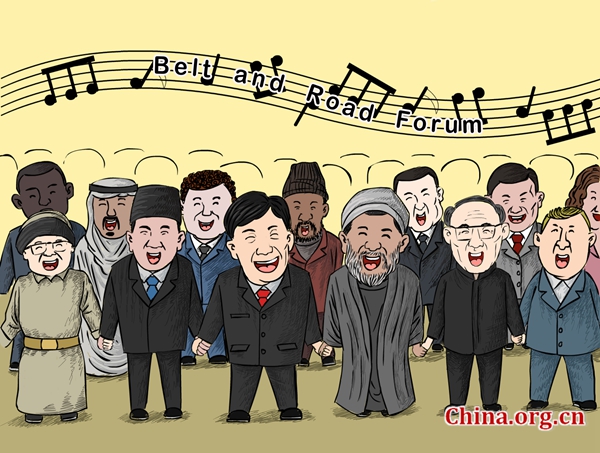Leveraging the Belt and Road Forum
- By Sajjad Malik
 0 Comment(s)
0 Comment(s) Print
Print E-mail By Sajjad Malik, April 30, 2017
E-mail By Sajjad Malik, April 30, 2017
|
|
|
The Belt and Road Forum for International Cooperation, which will be held in Beijing on May 14 and 15, will "explore ways to address problems facing the global and regional economies."[Zhang Xueshi/China.org.cn] |
The two-day event, officially known as the Belt and Road Forum for International Cooperation, will be held in Beijing on May 14-15. So far, 28 heads of state and government leaders have confirmed participation, while delegates from 110 countries as well as representatives of 61 international organizations will attend.
The purpose is to establish a platform for mutual cooperation in a global development program benefiting everyone without discrimination. It calls for a pooling of knowledge and resources for collective progress.
The Chinese-initiated effort to build a Silk Road Economic Belt and the 21st Century Maritime Silk Road focuses on trade and infrastructure networks along ancient trade routes reaching back many centuries. Simply, it is a well-planned endeavor to revive and rejuvenate the ancient Silk Road on a much larger scale.
However, it is not just a restoration of old trade ties, but it also seeks a prescription for global economic progress, which is currently susceptible to political upheavals, shrinking investment and increasing volatility due to many factors. The initiative provides a ray of hope in times of diminishing self-confidence and waning trust in the world economy and the concept of globalization.
The Belt and Road is a transnational network to connect Asia with Europe and Africa. Hence, no single nation can hope to completely translate it into reality. It can only really realize its full potential by cooperation among many nations. That is why the forum in Beijing creates such a great opportunity for closer consultation to prepare plans to fast-track its implementation.
Foreign Minister Wang Yi told the media on April 18 that China was upbeat about the Initiative in boosting mutual development and is willing to channel even greater energy into its achievement. China is also taking the lead in providing space for mutual consultations and funding various projects under the Belt and Road program.
According to Chinese sources, it has so far invested more than US$50 billion in Belt and Road countries since 2013. A total of 56 economic and trade cooperation zones have already been built, generating nearly $1.1 billion in tax revenue and creating an estimated 180,000 local jobs.
Pakistan's former ambassador to China Masood Khan has written that, under the project, China is helping to finance and build an infrastructure to develop the Eurasian land bridge and promote the South China Sea, Indian Ocean, Red Sea, the Suez Canal and the Mediterranean into a highly-connective route. Once completed, it is estimated the massive project would bring together as many as 4.4 billion people in 65 different countries to share common benefits.
Though the primary purpose is to speed up connectivity by expanding trade, investment, banking, insurance and other economic activities, it also provides leverage for peace gains. Once more people and countries are dependent on one another, the chances of conflicts decrease. Living standards will improve due to economic opportunities and more people can escape poverty and destitution.
The project provides an alternative model to develop a peaceful and stable international political and economic order governed by predictability and immune to occasional shocks, which can easily reverse the gain of decades in just weeks. The model is based on the principle of "economic development equals security" and it uses progress to balance security and strategic issues.
Thus, China, through the Belt and Road Initiative, is giving the world a new approach to economic and social change. It is based on more trade and commercial relations, that seek to include different regions and people. It means no one is being excluded from the fruits of common development. That is why Foreign Minister Wang Yi likened the Road and Belt to a "close circle of friends."
Sajjad Malik is a columnist with China.org.cn. For more information please visit:
http://www.china.org.cn/opinion/SajjadMalik.htm
Opinion articles reflect the views of their authors, not necessarily those of China.org.cn.







Go to Forum >>0 Comment(s)